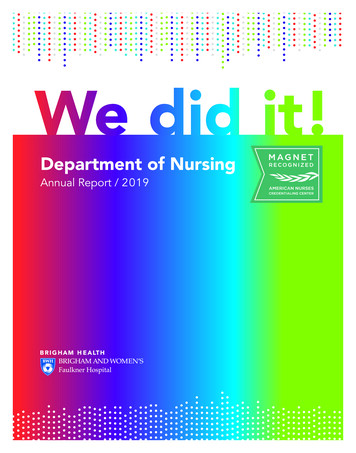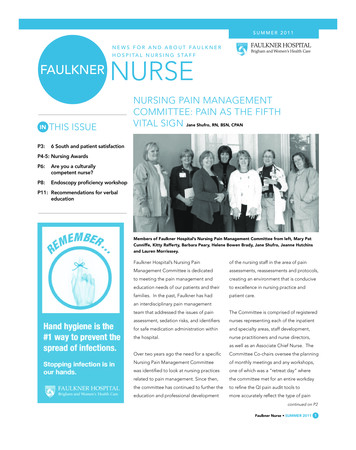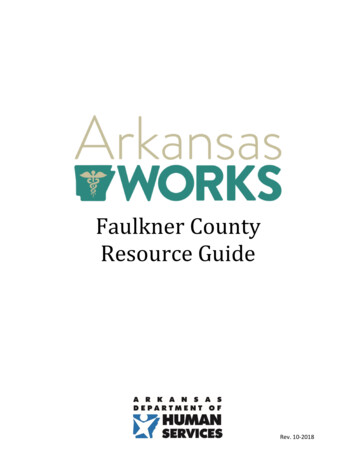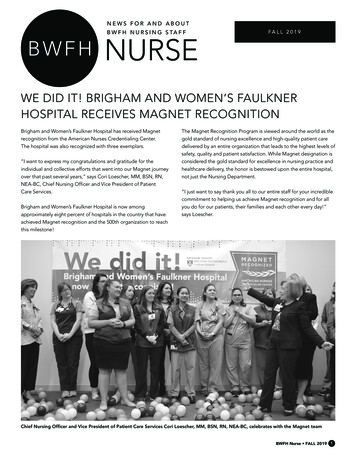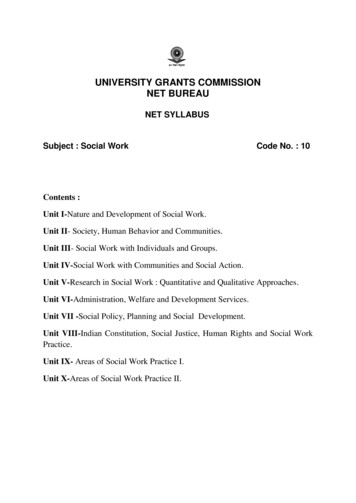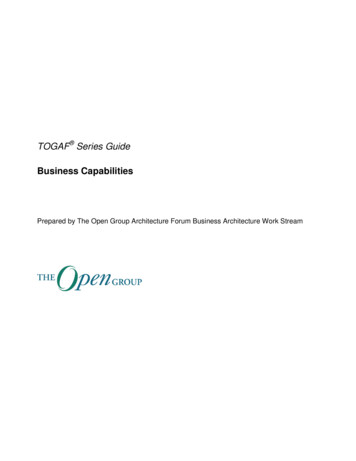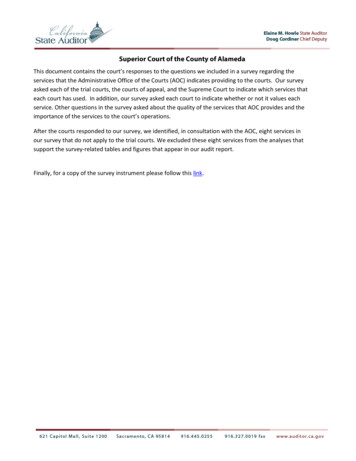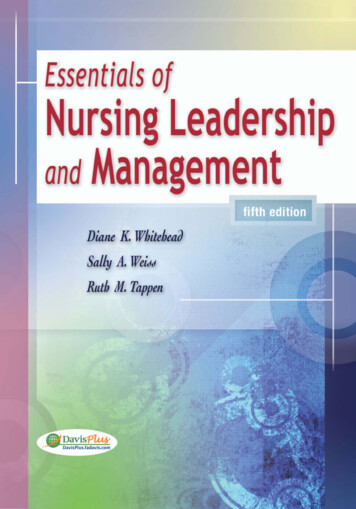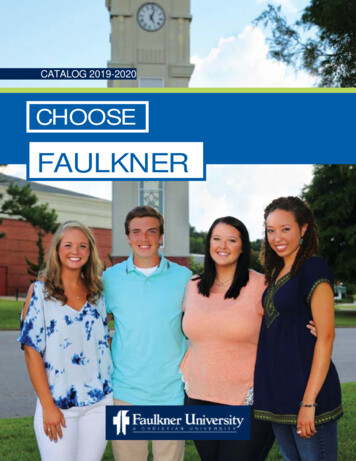
Transcription
CATALOG 2019-2020CHOOSEFAULKNER11
TABLE OF CONTENTSABOUT FAULKNERARTS & SCIENCESBIBLEBUSINESSEDUCATIONFAULKNER ONLINECOURSES22
CAMPUS LOCATIONSMontgomery Campus5345 Atlanta HighwayMontgomery, AL 36109-3398(334) 272-5820 or(800) 879-9816Birmingham Campus4524 Southlake ParkwayHoover, AL 35244(205) 879-5588Huntsville Campus420 Wynn DriveHuntsville, AL 35805(256) 830-2626Mobile Campus3943 Airport BoulevardMobile, AL 36608(251) 380-90903
FAULKNER UNIVERSITYA CHRISTIAN UNIVERSITYFaulkner University is accredited by the Southern Association of Colleges and SchoolsCommission on Colleges to award associate, baccalaureate, masters, and doctorate degrees.Contact the Southern Association of Colleges and Schools Commission on Colleges at 1866Southern Lane, Decatur, Georgia 30033-4097 or call 404-679-4500 for questions about theaccreditation of Faulkner University.4
LETTER FROM THEPRESIDENTDr. Michael D. WilliamsThe cornerstone of Faulkner University is an unwavering commitment to faith andlearning. Our chief aim is to engage our students in an academically rigorous pursuit to preparethem for productive lives of service. They are led by a distinguished faculty of Christianscholars who approach their discipline through a Christian worldview. We ask students to givetheir very best and be committed to academic integrity.You will find the University to provide a supportive environment where every individualmatters every day. We seek to provide services to help students identify their calling, sharpentheir skills, and fulfill their personal and professional aspirations. Finally, Faulkner students areencouraged to be deeply engaged in their community using their gifts to improve the lives ofothers.We are honored that you are considering this great University. I believe you will findFaulkner to provide a transformative experience, deep meaningful relationships, and aneducation to prepare you for a life of faith, altruism, and achievement.5
LEGAL STATEMENTSThe Faulkner University Undergraduate Catalog sets forth general academic policy andspecific undergraduate academic policy. The University also publishes separate GraduateCatalogs, which describe master’s and juris doctor programs, and a Student Handbook, alongwith supplementary publications for various programs.While the provisions of this catalog will ordinarily be applied as stated, the Universityreserves the right to change any provision listed in this catalog including, but not limited to,academic requirements for graduation without actual notice to individual students. Everyeffort will be made to keep students advised of any such changes. Information on changes willbe available in the Office of the Registrar and/ or the Office of the Vice President for AcademicAffairs. It is important that each student be aware of his or her individual responsibility to keepapprised of current graduation requirements for the student’s respective degree program.All students must read and follow the rules and regulations as presented in the StudentHandbook and such program specific supplementary handbooks as may be applicable. Thehandbooks contain the conduct regulations, penalties for failure to comply, grievanceprocedures, and so forth. Failure to follow the conduct regulations contained in thehandbook(s) can result in disciplinary action including suspension and expulsion from theUniversity. The Student Handbook and such program specific supplementary handbooks asmay be applicable, as they may be amended from time to time, are incorporated in this catalogby reference for all purposes.Students agree that any and all claims (in tort, contract or otherwise) asserted by themagainst Faulkner University or its employees that arise in any way whatsoever out of theirrelationship with Faulkner as students or former students will be governed either by applicableFederal law or by the local laws (both decisional and statutory) of the State of Alabama, exceptthat Alabama’s choice of law or conflict of laws provisions will not be applicable.Students agree that any civil action they commence against Faulkner University or itsemployees that arise in any way whatsoever out of their relationship with Faulkner Universityas students or former students can be heard only by a state or federal court sited in Alabama.6
Students agree to submit to the personal jurisdiction of the State of Alabama in the caseof any civil action instituted against them by Faulkner University or its employees that arises inany way whatsoever out of their relationship with Faulkner as students or former students.The Faulkner University Undergraduate Catalog, Graduate Catalog, Student Handbookand other handbooks or guides are available on the University’s website at www. faulkner.edu.University-Student AgreementStudent Rights and ResponsibilitiesUniversities and colleges exist for the transmission of knowledge, skills, and dispositionsfor the general wellbeing of society. A key commitment of the University is to the preservationand perpetuation of the principles of a democratic society, individual freedom, a government oflaw, the American spirit of community service, and personal responsibility. As a Christian liberalarts university, Faulkner accomplishes this through open inquiry, investigation, andengagement to promote knowledge, professionalism, critical thinking, leadership, lifelonglearning, and service to others. In this light, Faulkner University has established the followingmission- and vision-driven student rights and responsibilities to create a caring Christianenvironment for the development of the whole person.Student Rights: Students have a right to:1. Learn in a caring Christian environment.2. Participate in all areas and activities of the University, free from any form ofdiscrimination on the basis of race, color, national or ethnic origin, religion, sex,disability, age, or veteran status in accordance with applicable federal and state laws,except as otherwise permitted under federal or state law as a consequence of theUniversity’s religious mission and values.3. Participate in a free exchange of ideas within the mission, vision, and core values ofthe University.4. Personal privacy within the mission, vision, and core values of the University except asotherwise provided by the University’s policies, regulations, or procedures and thoseprovided by law.5. Receive or access the University Catalog, Student Handbook, University Calendar orother relevant program handbooks via the University website (www. faulkner.edu).6. Access modifications, enhancements, additions, or alterations to the materials listedin #5 above in a reasonable time frame via the University website (www.faulkner.edu).7
Student Responsibilities: Students have a responsibility to:1. Uphold the principles of personal and moral integrity contained within the Bible andexemplified by Christ.2. Foster the creation of a caring Christian environment.3. Foster the character traits of trustworthiness, respect, responsibility, fairness, caring,and citizenship within others and themselves.4. Respect and observe the personal privacy of others within the mission, vision, andcore values of the University, except as otherwise provided the University’s policies,regulations, or procedures and those provided by law.5. Respect the rights and property of others, including other students, the faculty, theadministration, the University and its vendors.6. Recognize that student actions reflect upon the individuals involved and upon theentire university community.7. Know, adhere to, and abide by the regulations, policies and procedures in the currentUniversity Catalog, Student Handbook, and relevant program handbooks.8. Know the modifications, enhancements, additions, or alterations to the regulations,policies and procedures to the current University Catalog, Student Handbook, andrelevant program handbooks posted on the University website (www.faulkner.edu).9. Know the University calendar including critical events and deadlines.10. Read and review all mail—electronic and otherwise—from the University.Postsecondary Student Rights under Family Education Rights and Privacy ActThe Family Educational Rights and Privacy Act (FERPA) (20 U.S.C. § 1232g; 34 CFR Part99) is a Federal law that protects the privacy of student education records. The law applies toall educational institutions that receive funds under an applicable program of the U.S.Department of Education. FERPA affords students certain rights with respect to their educationrecords. These rights include:1. The right to inspect and review the student’s education records within 45 days of theday the University receives a request for access.2. The right to request the amendment of the student’s education records that thestudent believes are inaccurate, misleading, or otherwise in violation of the student’sprivacy rights under FERPA.3. The right to consent to disclosures of personally identifiable information contained inthe student’s education records, except to the extent that FERPA authorizes disclosurewithout consent. FERPA authorizes the disclosure of certain information about studentsin the absence of their consent. This information is known as “directory information”8
and includes the following: student’s name, address, place of birth, major field of study,participation in officially recognized activities and sports, dates of attendance, degreesand awards received, and weight and height of athletes on an intercollegiate teamsponsored by the University. By this provision students and parents are hereby givennotice of the categories of information that the University has designated “directoryinformation” and that such information will be provided without consent of eitherstudents or parents UNLESS the parent, student or guardian informs the Registrar inwriting that some or all of such information should not be released without their priorconsent.4. The right to file a complaint with the U.S. Department of Education concerningalleged failures by the University to comply with the requirements of FERPA.5. The right to obtain a copy of Faulkner University’s student records policy. This policyis available in the Office of the Registrar.Americans with Disabilities Act and Section 504 of the Rehabilitation Act of 1973Faulkner University complies with Section 504 of the Rehabilitation Act of 1973 and theapplicable provisions of the Americans with Disabilities Act of 1990 and the Americans withDisabilities Amendments Act. (The University considers itself a religious institution that fallswithin the exemption regarding public accommodation provisions that Title III of the ADAprovides for such institutions.) Most campus buildings are equipped for and accessible tohandicapped persons. The University provides reasonable accommodations to students whoare otherwise qualified and who have documented disabilities. New construction is in fullcompliance with the Act.Nondiscrimination StatementFaulkner University does not discriminate on the basis of race, color, national or ethnicorigin, age, sex, marital status, religion, veteran status or disability in connection with itseducational policies, admissions, financial aid, educational programs, or activities to those whomeet its admission criteria and are willing to uphold its values as stated in this Catalog, theConduct Regulations contained in the Student Handbook and relevant program handbooks.Faulkner University is a church-affiliated liberal arts institution committed to employinga highly qualified and diverse administration, faculty and staff, who reflect the University’sreligious traditions, values, affiliation, and purpose. Thus, the institution invites individualsaffiliated with the Churches of Christ to submit applications regardless of race, color, national orethnic origin, age, gender, marital status, veteran status or disability. Faulkner University doesnot discriminate on the basis of race, color, national or ethnic origin, age, gender, marital status,or disability in connection with its employment practices. However, Faulkner University9
exercises a preference in employment for those qualified applicants who are members of theChurches of Christ, whose lifestyles are consistent with the mission of the University and withthe beliefs and values of the Churches of Christ. The religious tenets followed by the Universitymay also, in certain situations, limit or impact the employment of women in certain cases, forexample, as teachers or professors in its College of Biblical Studies, except for a ladies Bibleclass.Based upon this commitment, Faulkner University follows the principle ofnondiscrimination and operates within applicable federal and state laws prohibitingdiscrimination. As a recipient of federal financial assistance, Faulkner is required by Title IX ofthe Educational Amendments of 1972, as amended, not to discriminate on the basis of sex in itsadmissions policies, treatment of students, employment practices or educational programsexcept as required by religious tenets of the Churches of Christ. Faulkner has an EqualOpportunity Plan available upon request in the Office of Human Resources. Inquiriesconcerning the application of federal and state laws or regulations may be referred to theOffice of Human Resources.Athletic Participations Rates and Financial Support DataInformation regarding Faulkner’s athletic participation rates and financial support datais available to students, prospective students, and the public upon request. Copies of the reportare available in the Athletic Director’s Office.Harassment on the Basis of a Protected CharacteristicHarassment on the basis of any federal or state protected characteristic (race, color, sex,national origin, religion, age, disability) will not be tolerated by the University. It subverts themission of the University and threatens the careers, educational experience and well being ofstudents, faculty and staff. This catalog incorporates by reference as if fully set out herein theHarassment Policy of Faulkner University. Students who wish to make a complaint aboutdiscriminatory conduct on the basis of a protected characteristic, including harassment orsexual harassment, should file a complaint pursuant to the Student Complaints and ConflictResolution policy set forth in the Student Handbook.Smoking and WeaponsSmoking or other use of tobacco on University properties or in University facilities andvehicles is prohibited. Faulkner University prohibits possession, use, and transportation on10
University properties of any dangerous or potentially dangerous weapons, including fixed-bladeknives, shotguns, rifles, handguns, bows and arrows, crossbows, brass knuckles, air guns,swords, and fireworks or explosive devices.Campus Security Policy and Campus Crime Statistics ActFaulkner University complies with the Jeanne Clery Disclosure of Campus Security Policyand Campus Crime Statistics Act, which requires the compilation and dissemination of certaincrime data and security. Campus Crime Statistics are posted on the University website.11
MISSION, VISION & COREVALUESMissionThe mission of Faulkner University is to glorify God through education of the wholeperson, emphasizing integrity of character in a caring Christian environment where everyindividual matters every day.Overview of Institution and CharacteristicsFaulkner University is a private, church-affiliated, liberal arts based institution in thetradition of American higher education. In this tradition, Faulkner seeks to educate the wholeperson in preparation for success in a pluralistic democratic society. Faulkner follows theChristian liberal arts tradition of open inquiry, investigation, and engagement to promoteknowledge, professionalism, critical thinking, leadership, lifelong learning, and service toothers.Faulkner University’s campuses primarily serve four metropolitan communities—Montgomery, Birmingham, Huntsville, and Mobile—within Alabama. The four communities areall urban environments with contiguous suburban and rural areas. The four communities areclassified as metropolitan statistical areas (MSA) by the U.S. Census Bureau.History of the UniversityFaulkner University is a multi-campus, co-educational, private, Christian institution ofhigher education offering Associate’s, Baccalaureate’s, Master’s, and Doctoral degrees toprepare students for professions or advanced studies in Bible, liberal arts, sciences, and/orbusiness.Founded as a two-year Bible college in 1942, Faulkner has evolved into an independent,co-educational institution in the Christian liberal arts tradition. Faulkner has grown from a13
small, seminary based institution to a university with six academic divisions on theMontgomery campus— the Alabama Christian College of Arts and Sciences, the College ofEducation, the College of Health Sciences, the Harris College of Business and ExecutiveEducation, the Thomas Goode Jones School of Law, and the V.P. Black College of BiblicalStudies—as well as three extended campuses in Birmingham, Huntsville, and Mobile. Faulknerhas two academic research and outreach centers: the Cloverdale Center for Youth and FamilyMinistry and the Institute for Faith and the Academy. The cornerstone and distinctivecharacteristic of Faulkner is the infusion of Christian ethics, morals, values, and concern forothers throughout the entire institution. Emphasis is placed on conveying the knowledge toempower the pursuit of personal goals and life-roles, and to enable daily life as productiveChristians and citizens of a pluralistic democratic society. Our commitment to Christian ethicalideals extends to the individual, family, church, community, nation, vocation, and profession.Our interest is not only in what an education helps students to be in their lives, but also whatan education helps them to do with their lives.VisionAnchored in biblical truth, Faulkner University will be recognized globally as a vibrantChrist-centered community where academic excellence, spiritual growth, and a personaldedication to service combine to equip graduates with the tools to make a profound and lastingdifference in their chosen fields, families, churches, and communities.Core Commitments1.2.3.4.5.Steadfast commitment to biblical truth and Christian principles;Demonstrated care for every student, every day;Excellence in teaching and learning;Intentional, spiritual mentoring of the total life of the student; andFostering respect and preservation of fundamental principles that acknowledge thereligious, intellectual, social, economic, and individual freedoms we enjoy as blessings fromour Creator.14
ACCREDITATION &AFFILIATIONRegional AccreditationFaulkner University is accredited by the Southern Association of Colleges and SchoolsCommission on Colleges to award associate, baccalaureate, masters, and doctorate degrees.Contact the Southern Association of Colleges and Schools Commission on Colleges at 1866Southern Lane, Decatur, Georgia 30033-4097 or call 404-679-4500 for questions about theaccreditation of Faulkner University.Specialized AccreditationKearley Graduate School of TheologyThe Kearley Graduate School of Theology is accredited by the Commissionon Accrediting of the Association of Theological Schools. The following degree programs areapproved by the Commission on Accrediting: Doctor of Philosophy in Biblical Studies, Master ofArts (Biblical Studies), and Master of Arts in Christian Ministry. In June 2018, the ATS Board ofcommissioners approved a four-year experimental Doctor of Philosophy (Biblical Studies)degree, permitting the degree program to be completed in a synchronous distance educationformat.The Commission on Accrediting of the Association of Theological Schools10 Summit Park DrivePittsburgh, PA 15275-1110Phone: 412-788-6505Legal StudiesFaulkner University’s Legal Studies program, offered on the main campus inMontgomery, Alabama, is approved by the Amer
University Catalog, Student Handbook, and relevant program handbooks. 8. Know the modifications, enhancements, additions, or alterations to the regulations, policies and procedures to the current University Catalog, Student Handbook, and relevant program handbooks posted on the University website
